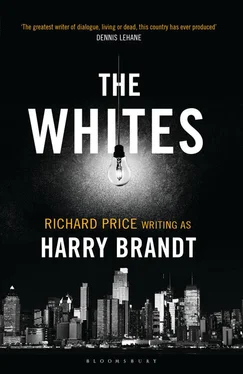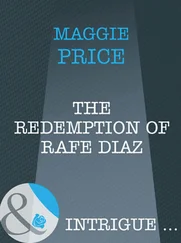“Anyways,” Billy Senior rising, “I have to go pick up your grandmother at the bank.”
Declan looked to Billy, then back to his grandfather. “Grandpa,” he said not unkindly, “Gramma’s dead.”
Billy Senior stopped at the door, turned to the table. “That’s not a very nice thing to say, Declan.”
Billy watched his father go out to the driveway and get in the keyless sedan, knowing he’d sit there until he forgot why he was sitting there, then come back inside.
Up in the bedroom, Billy stashed his Glock, stripped down to his boxers, and fell into bed. Fighting off sleep, he stared at the ceiling until he could hear Millie’s muffler-shot old beater coming down the street, signaling the start of her workday, which consisted of impersonating a housekeeper and, more importantly, watching daytime TV with his father. She would sit as close to Billy Senior as she could without jumping on his lap, while constantly touching his arm and commenting on the screen action, all in an effort to keep him in the here and now, which was becoming an increasingly demanding job.
In the way of these things, Billy’s father had become his child, and he was determined to parent him in the manner in which he had been parented himself — with patience, amusement when he could manage it, and an infinite tolerance for the weakness of his mind. Growing up, Billy’s mother had been just his mother, doing her duty as required, not exactly indifferent to him but more focused on raising and training his sisters, two out of three children, in her eyes, job enough. As a father, Billy Senior had been low-key but there, not much more demonstrative than his wife but a powerfully comforting presence in his son’s life nonetheless. When he was home, he was home all the way — a skill Billy had yet to master with his own family — and no fool when it came to wading through his son’s alibis regarding everything from flunking Spanish and Biology, to adolescent beer benders, to a brawl in a White Castle parking lot. He rarely punished and, in a neighborhood where half the parents seemed to treat their screw-up sons like piñatas, never with his hands. But most important to Billy, his father attended all his football games, from peewee and sandlot through varsity, without ever once shouting red-faced from the sidelines or criticizing his son’s play. In the Nassau County Youth League, when Billy had quarterbacked his team to a 3–0 midseason mark only to have his coach replace him with his own athletically inferior son, he remembered his father that Saturday morning trying to reason with the guy, but when he realized that the conversation was futile, he just shrugged and walked away, his eyes shining, on the edge of tears.
At Hofstra, which Billy attended for two years on a football scholarship, his father continued to show up in the stands, making it to the majority of the Pride’s away games, including overnight trips to Orono, Maine, and Burlington, Vermont, until it all came to an end in the spring of his sophomore year, when Billy was busted for selling weed in the dorms. His father used whatever connections he had with the Hempstead PD to prevent Billy from being formally arrested, but he made no effort to intervene when Hofstra booted him off the campus. And when Billy came home the day of his expulsion, crushed and too ashamed to ask for his parents’ forgiveness, his father, deciding that his kid’s self-laceration was punishment enough, simply asked him what he intended to do with his life. When Billy couldn’t come up with an answer, either that first night or the next, then and only then did he suggest the police academy.
When Billy came back downstairs at three in the afternoon, he was surprised to find Carmen’s younger brother, Victor Acosta, and Victor’s husband, Richard Kubin, standing together in a corner of the kitchen. Only two years younger than his sister, Victor looked barely old enough to vote, an effect, Billy thought, that had less to do with his short stature or his absurdly buffed physique than with his permanent expression of readiness — wide, alert eyes beneath arched, nearly triangular brows, lips slightly parted — making him appear as if he were perpetually attempting to pick up a distant voice bearing important news.
“Hey, what’s up,” Billy mumbled, embarrassed to still be in his pajamas.
“Hey,” Victor said flatly, shaking his hand without meeting his eyes.
“You all right?” Billy asked, his brother-in-law coming off uncharacteristically grim, a photo negative of himself.
“Fine.”
“Hey, how are you?” Billy extending his hand now to Richard, older, less eager-eyed, an easygoing enough guy — no gym for him — who tended to fade into the background when it came to Victor’s family.
“I’m good,” Richard saying it like he wanted to leave but didn’t want to offend anyone.
“Where’s Carmen?”
“Here.” A third flatliner heard from, his wife standing behind his back in the opposite corner of the room, her arms crossed over her chest, her eyes fixed on the floor.
“What happened?”
“Nothing,” Carmen said without looking up.
“Nothing?” Victor said sharply.
“What happened,” Billy addressing the men now.
“We’re adopting,” Victor said. “That’s all.”
Carmen exhaled through her nose, studied the tilework.
“We just came by to share the good news,” Richard added, his voice so even-keeled that Billy couldn’t tell if he was being sarcastic.
“No, I’m happy for you,” Carmen said, her gaze shifting to the backyard. “I am.”
Billy followed the men out to their ancient Range Rover in the driveway.
“So wow, adopting,” he scrambled. “Where from?”
“Brazil,” Victor said.
“Brazil, huh. Boy? Girl?”
“One of each.”
“Twins?”
“Can’t break up a set,” Richard said, unlocking the driver’s-side door.
My husband… Billy had never thought of himself as having a problem with gay marriage, but he still couldn’t quite wrap his head around another man uttering those two words.
“Did you tell your sister it’s two?”
“I would’ve,” Victor said, “but I was afraid her heart couldn’t handle the joy.”
“Anyways, that’s terrific, really great,” Billy said, then added by way of apology: “You want us to throw you a baby shower or something?”
At least that got them smiling.
When he returned to the house, Carmen was still standing wedged into her corner of the kitchen.
“What the hell’s wrong with you?”
“Heather has two daddies,” she muttered, looking away.
“I don’t get it, your brother comes over with such big news, you couldn’t even give him a hug or something?”
“Guess not,” she said defiantly but starting to tear up a little.
“Just tell me what’s going on.”
“Why does something always have to be going on with you?” she snapped, then walked out of the kitchen, up the stairs, and into the bedroom, closing the door behind her.
And that’s where they left it. That’s where they always left it when it came to Victor and, if he thought about it, so much else.
At five in the evening, Billy walked into Brown’s Family Funeral Home, on Adam Clayton Powell Boulevard. The chapel, a glorified living room, fluorescently lit and lined with folding chairs, was standing room only and awaft in dope smoke. A twenty-two-year-old banger tagged Hi-Life, who had been shot dead in retaliation for an earlier retaliation, lay in his coffin in a front corner of the chapel facing his people, most of whom were wearing oversized rest-in-peace T-shirts silk-screened with a photo of Hi-Life sitting on a stoop. A second laminated RIP snapshot on a bead chain hung off their necks like a backstage pass.
Читать дальше












